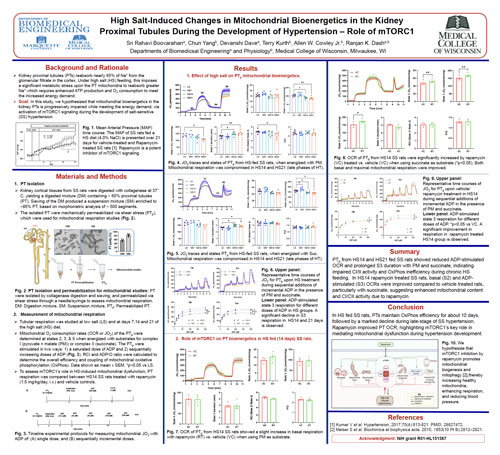BME Postdoctoral Researchers win Professional Development Awards
Please join us in congratulating Drs. Sayantan Sinha and Sri Rahavi Boovarahan, postdoctoral researchers in the Joint Department of Biomedical Engineering, who have been selected as recipients of the Professional Development Award from the Medical College of Wisconsin’s Office of Postdoctoral Education. This competitive award supports postdoctoral researchers in advancing their scientific and professional careers by providing financial assistance to participate in activities such as attending conferences, professional workshops, specialized training, or laboratory exchanges to learn new techniques. Awardees are selected through a peer-review process that recognizes exceptional initiative and commitment to career growth.
Sinha's Awarded Research
 Dr. Sinha's current research focuses on improving treatment strategies for triple-negative breast cancer by combining immuno- and photo-dynamic therapy. Dr. Sinha has developed a unique nanoparticle system capable of delivering an immune-boosting molecule (IL-12) and light-activated drug directly to tumors. An abstract supporting this work, titled “Multimodal liposomal organic nanoparticle for immunomodulation and photodynamic combinatorial therapy for triple-negative breast cancer,” was presented at American Association for Cancer Research (AACR) Annual Meeting in 2025, where Dr. Sinha discussed this dual approach to treating breast cancer. According to the study, the therapy showed a reduction in tumor growth, per preclinical models, as well as a reduction in many side effects often seen with traditional IL-12 therapies. Dr. Sinha's findings represent a promising step toward more targeted, less toxic treatments for triple-negative breast cancer and, perhaps, other prevalent malignancies.
Dr. Sinha's current research focuses on improving treatment strategies for triple-negative breast cancer by combining immuno- and photo-dynamic therapy. Dr. Sinha has developed a unique nanoparticle system capable of delivering an immune-boosting molecule (IL-12) and light-activated drug directly to tumors. An abstract supporting this work, titled “Multimodal liposomal organic nanoparticle for immunomodulation and photodynamic combinatorial therapy for triple-negative breast cancer,” was presented at American Association for Cancer Research (AACR) Annual Meeting in 2025, where Dr. Sinha discussed this dual approach to treating breast cancer. According to the study, the therapy showed a reduction in tumor growth, per preclinical models, as well as a reduction in many side effects often seen with traditional IL-12 therapies. Dr. Sinha's findings represent a promising step toward more targeted, less toxic treatments for triple-negative breast cancer and, perhaps, other prevalent malignancies.
Dr. Sinha is a postdoctoral researcher working in the Nanomedicine & Image-Guided Interventions Laboratory under the direction of Dr. Amit Joshi. NIGIL’s research aims to develop innovative, minimally invasive, and non-toxic diagnostic and therapeutic technologies to address cancer, pulmonary and infectious diseases, and other vascular conditions.
Learn more about Research at NIGIL
Boovarahan's Awarded Research
 Dr. Boovarahan received the Professional Development Award for two posters presented at the American Physiology Summit in 2025: High-salt-induced changes in mitochondrial bioenergetics in the kidney proximal tubules during the development of hypertension: role of mTORC1,” and “A comparative study of permeabilized proximal tubules and cortical mitochondrial respiratory functions in kidneys.”
Dr. Boovarahan received the Professional Development Award for two posters presented at the American Physiology Summit in 2025: High-salt-induced changes in mitochondrial bioenergetics in the kidney proximal tubules during the development of hypertension: role of mTORC1,” and “A comparative study of permeabilized proximal tubules and cortical mitochondrial respiratory functions in kidneys.”
Dr. Boovarahan's research investigates how high-salt diets affect kidney cell energy production and contribute to salt-sensitive hypertension. She found that kidney cells can maintain energy efficiency for a short time under high salt intake, but prolonged exposure leads to mitochondrial dysfunction, an effect that can be improved by blocking a key signaling pathway (mTORC1). Her second study compared two experimental methods for studying kidney mitochondria and confirmed that her newly developed technique provides reliable, cell-specific insights into kidney energy metabolism.
 In addition to receiving the Professional Development Award, Dr. Boovarahan was also honored with a poster award at the 35th Annual Graduate School Research Poster Session at the Medical College of Wisconsin for her work on mitochondrial bioenergetics and hypertension, discussed above.
In addition to receiving the Professional Development Award, Dr. Boovarahan was also honored with a poster award at the 35th Annual Graduate School Research Poster Session at the Medical College of Wisconsin for her work on mitochondrial bioenergetics and hypertension, discussed above.
Dr. Boovarahan is a postdoctoral researcher in the Computational Systems Biology Laboratory working under the direction of Dr. Ranjan Dash. Research in the CSBL focuses on developing advanced computational models to better understand how the body functions and how diseases progress. By combining these models with experimental data, the lab helps reveal how illnesses begin at the molecular level and supports the discovery of new treatment options.
Learn more about CSBL Research

 Dr. Sinha's current research focuses on improving treatment strategies for triple-negative breast cancer by combining immuno- and photo-dynamic therapy. Dr. Sinha has developed a unique nanoparticle system capable of delivering an immune-boosting molecule (IL-12) and light-activated drug directly to tumors. An abstract supporting this work, titled “
Dr. Sinha's current research focuses on improving treatment strategies for triple-negative breast cancer by combining immuno- and photo-dynamic therapy. Dr. Sinha has developed a unique nanoparticle system capable of delivering an immune-boosting molecule (IL-12) and light-activated drug directly to tumors. An abstract supporting this work, titled “ Dr. Boovarahan received the Professional Development Award for two posters presented at the American Physiology Summit in 2025:
Dr. Boovarahan received the Professional Development Award for two posters presented at the American Physiology Summit in 2025: 
